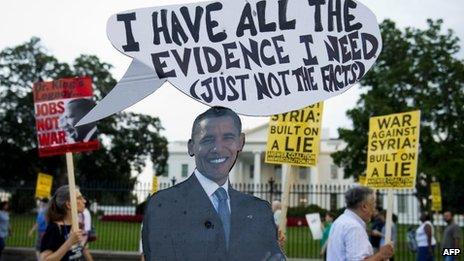UK Syria vote leaves US asking 'what's so special?'
- Published
- comments

Americans have shown scant interest in intervention in Syria
The vote of British MPs against military intervention in Syria is likely to send shock waves through the Obama administration. Britain has tended to march in lockstep with the US and this rejection of President Barack Obama's argument will leave bruises.
Before the vote the administration was fairly sanguine about David Cameron's difficulties and the delay in the UK joining any action.
It may be a different story now that it is clear Britain, so often cast as America's poodle, won't take part at all.
A senior administration official has told the BBC that they will continue to consult with the UK government, whom they call "one of our closest allies and friends".
But the official adds: "President Obama's decision-making will be guided by what is in the best interests of the US. He believes that there are core interests at stake for the US and that countries who violate international norms regarding chemical weapons need to be held accountable."
In other words, America could go it alone.
But that is uncomfortable. There is no question that it has the military might, though that is hardly the point.
Mr Obama has always made a point of seeking the widest possible international support.
To be abandoned by such a close ally leaves him looking particularly exposed.
My guess is that there will be renewed emphasis on the role of the French, the Turks and perhaps others. It will strengthen the hand of those in Congress who argue they should have their own vote.
It undermines the effort of the president to sell action to his own people, who seem to be deeply unimpressed by his arguments so far (the last opinion poll I saw had just 9% backing intervention).
I imagine there will be a lot of apologetic British officials in Washington trying to reassure their American counterparts that this is a one-off and won't affect the special relationship.
But that relationship is only to an extent about culture and history and language - it is about the military and intelligence relationship above all.
If Britain can't deliver, it will leave some in the US asking "what's so special?"